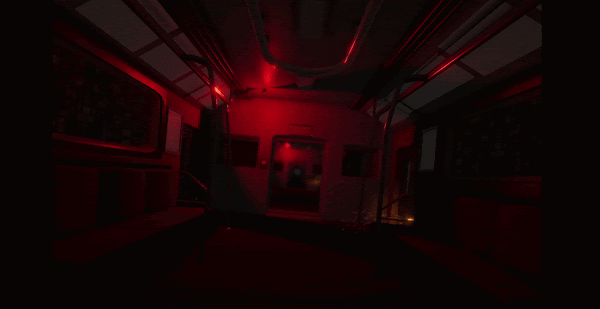Commute
An Interactive Horror Ride
WARNING: This game and its recordings feature flashing lights and loud sounds which may affect users with photosensitive epilepsy or other photo sensitivities.




Commute Overview:
-
An interactive horror ride built using the Entertainment Technology Center's Cave hydraulic floor and surround projection screen system
-
5-person development team (2 programmers, 2 artists, 1 sound designer)
-
I personally focused on narrative design and project production/management
-
Commute was ultimately selected for showcase at the ETC Fall Festival and received over 300 guests
Creative Goal:
-
Tell an interactive horror story by simulating a subway using the CAVE's pneumatic platform. Live actors were also deployed to keep the entire experience cohesive and brisk.
Process over 2 weeks:
-
Week 1: Display a Subway interior on CAVE screens and simulate a subway crash on the platform
-
Week 2: Refine narrative arc between 3 train cars, implement monster, design puzzles, rehearse script
Process after acceptance to Festival
-
Week 3: Playtest ways to make the experience work with less manpower and design a new, more dramatic ending
-
Week 4: Rehearse new ending with all actors, create rotating actor schedule, and refine flashlight "feel" (make it easier to make monsters go away)


Design Tools used
-
Frequent playtesting and iteration of intuitive player "actions"/"controls" in the CAVE
-
Drafting of improvisational acting beats
-
i.e. the Subway worker will always say "look at that smoke" to draw player attention to the monster
-
-
Moving from working prototype to working prototype, pivoting as necessary (agile)
-
Fine tuning flashlight/monster "feel"
-
Players cannot lose the game, but they have to think they can
-
.png)
.png)
Production Tools used
-
Agile-based feature lists that are agreed upon by the team for the next build version
-
Collective brainstorming to find an idea everyone could be excited by
-
Letting teammates agree on deadlines and the order they want to perform tasks
-
Consulting experts for help with pneumatic platform, trip hazards, warning signs
-
resident electrical engineer David Purta and set designer Ruth Comley
-
-
Facilitating communication between teammates of different disciplines, languages, and cultures
-
Prioritizing key features and functionality over others
-
e.g. making a subway scene appear on all screens before creating a detailed monster model)
-
Future Features
-
Make the experience run automatically, i.e. without physical actors or board operators
-
e.g. Train Conductor gives tips through intercom/speakers
-
-
Make the experience longer to justify having actors and specific showtimes
-
Adding more tools/puzzles
-
Incorporating more ride elements
-
-
Incorporate more practical effects
-
e.g. fake blood, real monster costumes, smoke machines, etc.
-










